The complete guide to home viewing
Get Screen Gab for everything about the TV shows and streaming movies everyone’s talking about.
You may occasionally receive promotional content from the Los Angeles Times.
Things will surely look different once television shows are allowed back into production. As with other industries about to reopen, on-set safety during this pandemic will demand certain restrictions be put into place, restrictions that could change how stories get told. And maybe that’s not such a bad thing, says Dahvi Waller, showrunner for “Mrs. America,” the limited series about the push for the Equal Rights Amendment.
“Sometimes when you have constraints placed on you, you creatively come up with something new and different that’s really great. Like in the first half of the 20th century, when there was so much censorship and you couldn’t show nudity, you had really fascinating, funny, witty female characters (who then disappeared the second women were able to take their clothes off on screen),” Waller noted at the Envelope Showrunners Roundtable in mid-May.
Ted Danson, Jane Lynch, Linda Cardellini, Annie Murphy, William Jackson Harper and Nicholas Hoult discuss their fears and their funniest moments.
“I think it could be really fun to see how we work around these constraints and what gets created out of this. Although right now I can’t concentrate on anything,” she added.
Steven Canals, the creative force behind “Pose,” a musical drama exploring the LGBTQ ball culture, agrees. “New York shut down just as we were completing our Season 3 premiere, so we still have an entire season left to film. This period of isolation has been all of us culling through each of the scripts we have written and trying to sort of guess the moments where we’ll probably have to make some adjustments, and now working really hard to come up with creative solutions.”
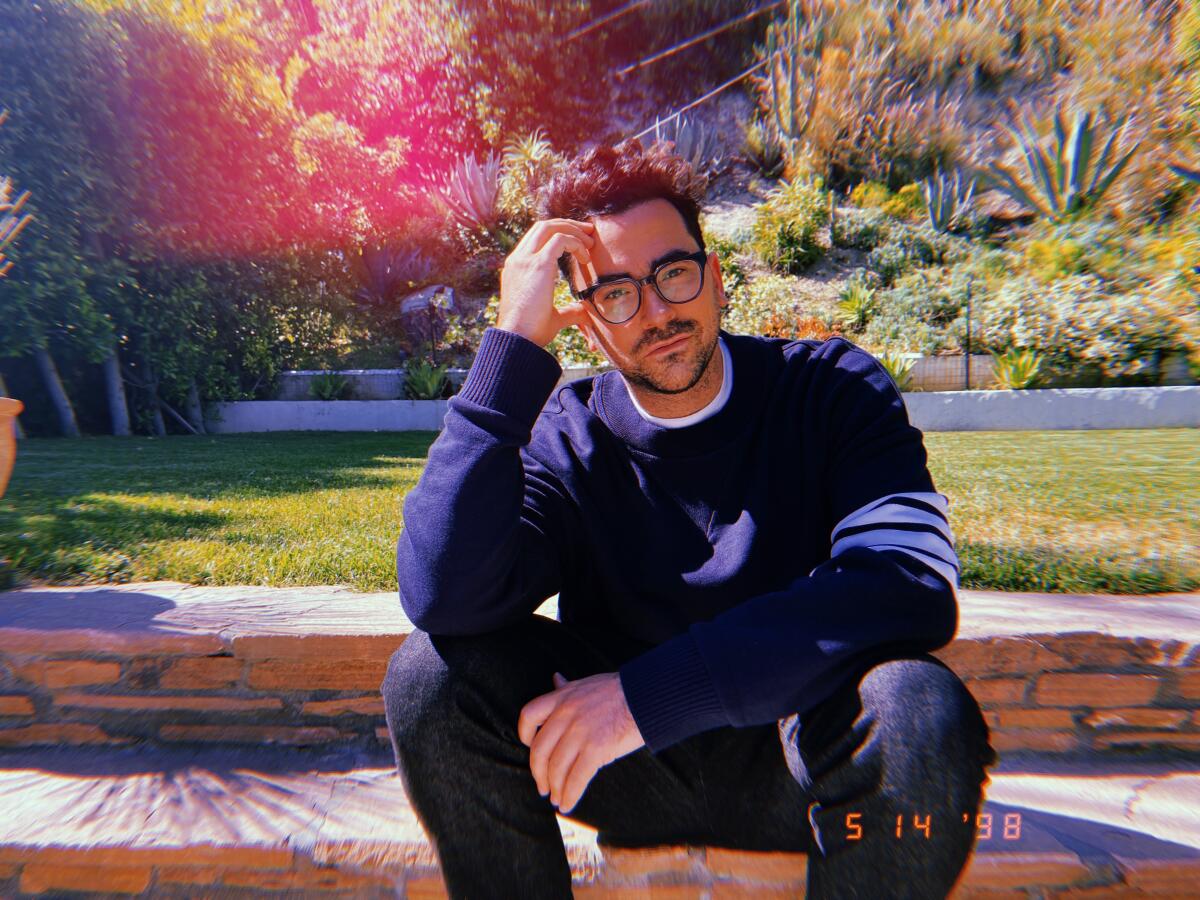
Waller and Canals, along with showrunners Kerry Ehrin of “The Morning Show,” Susannah Grant of “Unbelievable,” Dan Levy of “Schitt’s Creek” and Chuck Lorre of “The Kominsky Method” connected with L.A. Times culture columnist L.Z. Granderson in a video conference for a wide-ranging conversation that included the need for opening writers rooms to specific viewpoints, delivering hard information within a compelling story and the mechanics of getting hit in the face with a pie.
The conversation that follows has been edited for length and clarity.
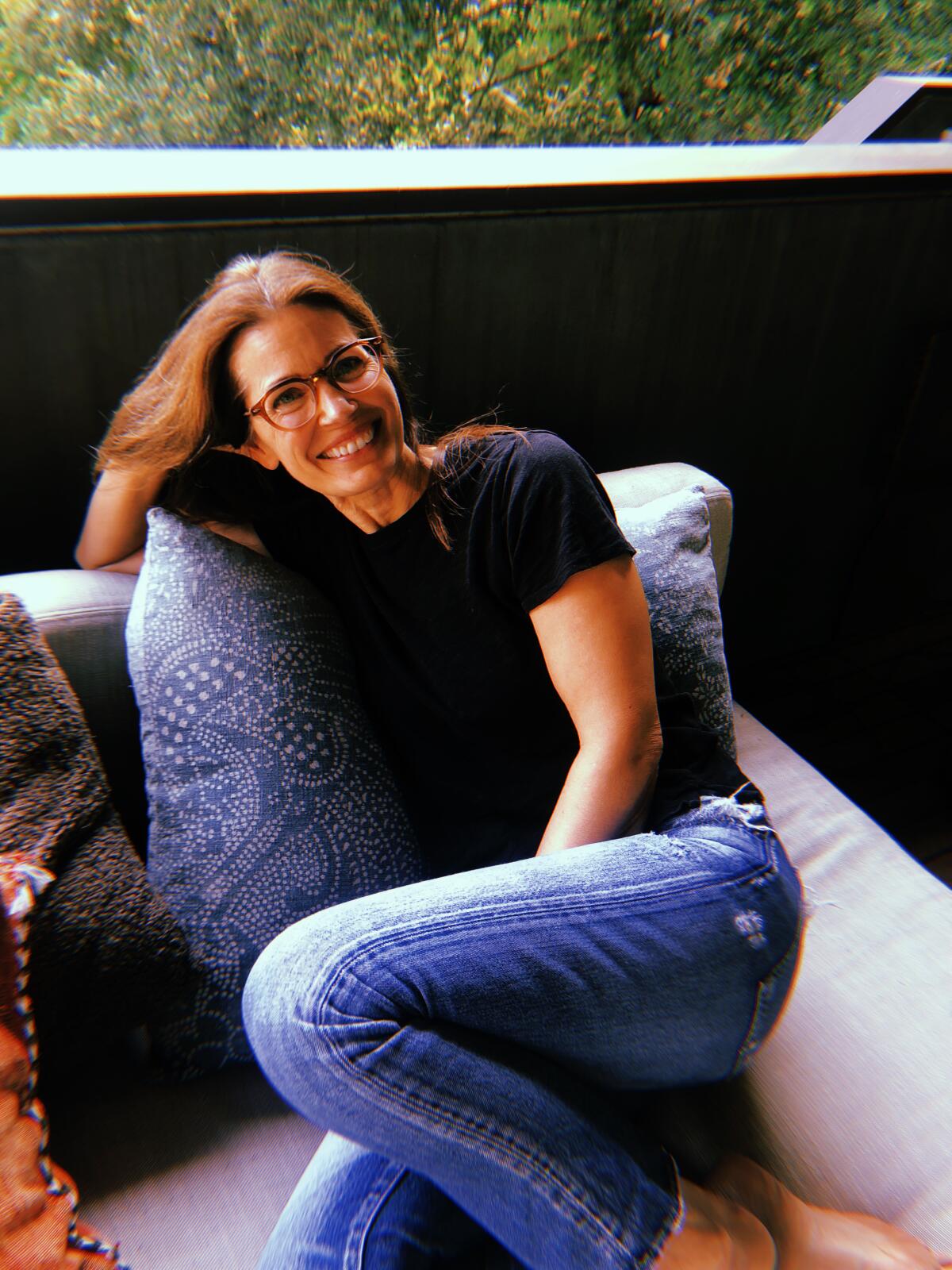
Let’s start with “The Morning Show” and “Unbelievable,” which deal with sexual harassment and sexual assault. Susannah, what was it about “Unbelievable,” a real-life story of the hunt for a serial rapist, that you wanted to get across?
Susannah Grant: Well, it’s based on an article that was just a tremendous piece of journalism by T. Christian Miller and Ken Armstrong. When I read the story, it brought to life so many of the things I had heard in terms of statistics or advocacy but hadn’t felt the heartbeat of. It just felt like it lent itself really well to telling in this other form. The thing I love about the story is that it presents the problem in stark realism but also presents the solution.
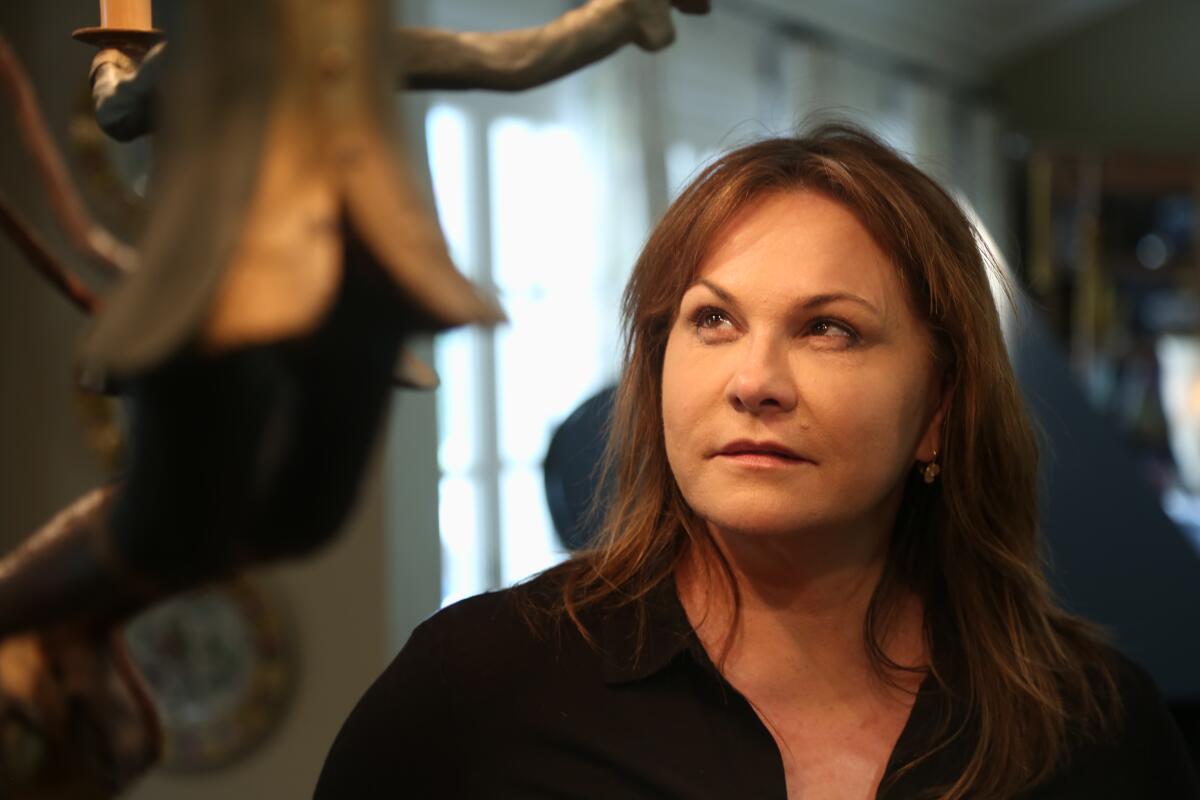
Kerry, you cast Steve Carell, who is one of the most likable men in Hollywood, and you made him the serial sexual harasser on a network morning news program. Was that a conscious choice?
Kerry Ehrin: Yes. I think that a lot of people who get away with these things are incredibly likable and charming. That’s part of how the people around them blur their own morality and their own judgment. It’s all a complicated equation, that was a really important part of it.
I think that a lot of people who get away with these things are incredibly likable and charming. That’s part of how the people around them blur their own morality and their own judgment.
— Kerry Ehrin, “The Morning Show”
Was it difficult to convince him to take the role?
Ehrin: No. I mean, it’s a great role. It’s a meaningful role. It’s never fun to play someone ... Well, it is fun to play people who are morally bankrupt, but it isn’t fun to be a villain in this particular scenario. I thought he did just such a really brave job doing it.
“The Morning Show” showrunner Kerry Ehrin on casting Steve Carell.
Those stories are both elements of the current #MeToo movement. Dahvi, your story [“Mrs. America”] goes back farther, the fight for — and against — the Equal Rights Amendment. What were you interested in with this story?
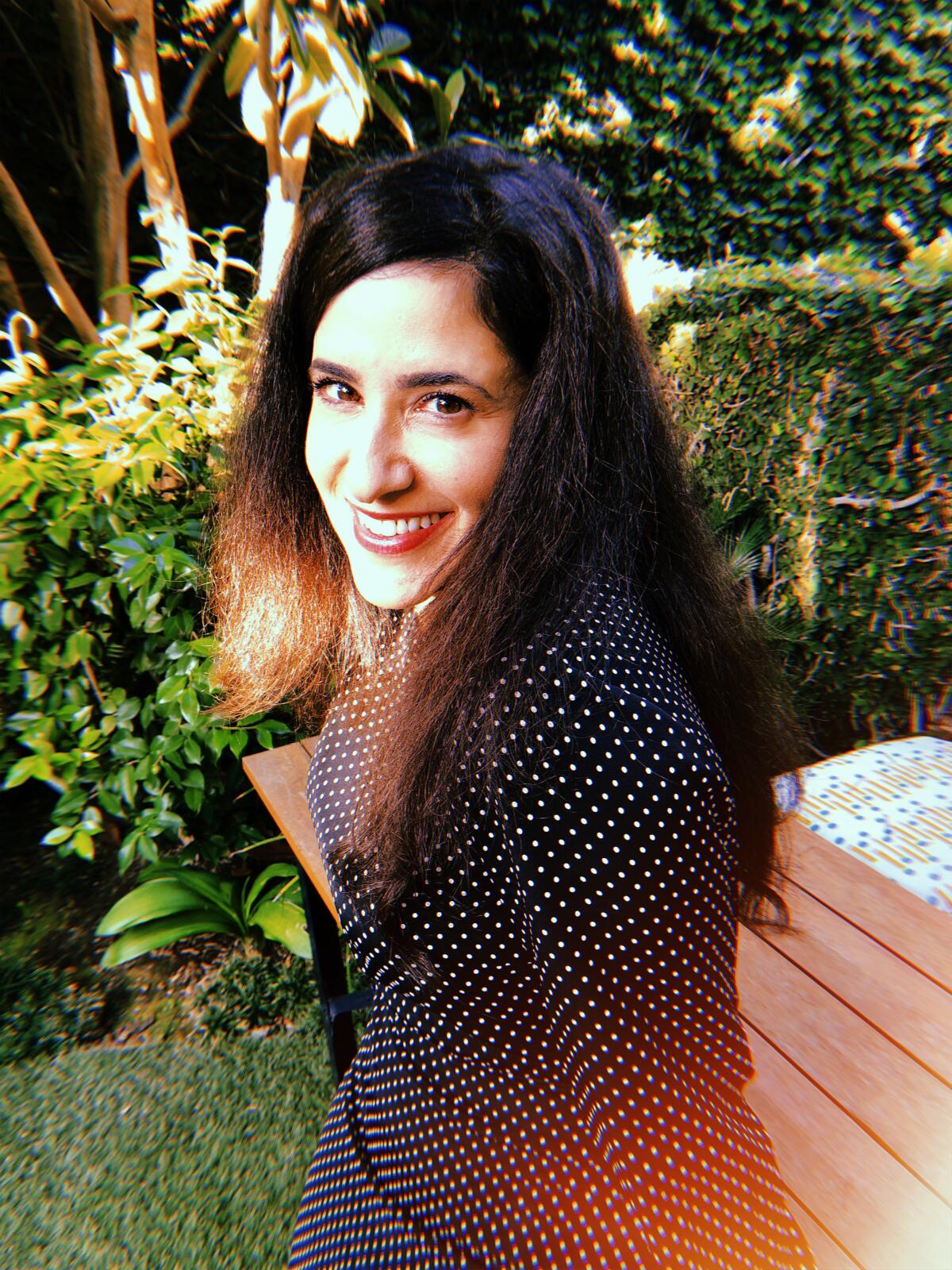
Dahvi Waller: I was interested in giving a fuller context to this time period. I studied the women’s movement and didn’t really understand why it lost momentum after 1980. Once I started learning about Phyllis Schlafly and the Stop ERA movement, I really started to understand the patterns of how society progresses and the inevitable backlashes. That really was probably what drove me to explore this topic. As we got past the 2016 election, I felt more of a drive to get this message out. The central question for me was, sisterhood is powerful, but is it transcendent? Does it transcend tribalism? Does it transcend sexuality or other ties?
Sisterhood is powerful, but is it transcendent? Does it transcend tribalism? Does it transcend sexuality or other ties?
— Dahvi Waller, “Mrs. America”
You told a lot of your story through the point of view of Phyllis Schlafly (played by Cate Blanchett), who was staunchly opposed to the ERA. How did that choice come about?
Waller: I wanted to create a show where all the women are very complicated and complex and messy. The backlash just seemed like a more unexpected way in than through the social change movement. At the same time, I wanted the show to have all the voices of the feminist leaders as well, and really give them their due.
“Mrs. America” showrunner Dahvi Waller on why now is the time for this historical drama.
Dan and Steven, you touch upon LGBTQ issues in your shows, “Schitt’s Creek” and “Pose,” but from very different perspectives. What informed the direction you each took?
Dan Levy: It was about trying to tell stories about love and relationships that I felt respected my own experience and the experience of my friends who are in the community. We made a choice very early on not to show homophobia. It was something that took a lot of thought, obviously. Because you don’t want to necessarily depict a completely unrealistic version of life, but there was something really fascinating in projecting a version of our world that was kinder and more empathetic. Even if we are saying it’s a bad thing, by removing [homophobia] from the equation, we were essentially not allowing those types of people to see themselves on screen.
We made a choice very early on not to show homophobia ... there was something really fascinating in projecting a version of our world that was kinder and more empathetic.
— Dan Levy, “Schitt’s Creek”
You did have one moment in which your character’s fiance, Patrick (Noah Reid), comes out to his parents. What was that process like?
Levy: It was quite tricky because I think the coming-out story has been told a lot of times and really beautifully. For us, it was a tough thing to build tension in a story where you know it’s going to be resolved in a hopeful way. A lot of people who are coming out fear that their parents won’t accept them. [For Patrick’s parents,] their fear is not, “What have I done to have my child be gay?” but rather “What have I done to not lay the foundation that would make him feel comfortable enough to come out?” It was my favorite episode, I think, that we’ve ever done. It was beautifully acted, and it’s very rare when you get those moments to really tell stories about your own experience on kind of a mass scale.
“Schitt’s Creek” showrunner Dan Levy on creating a “kinder” world than our own.
Steven, the world you painted for “Pose” is very different. Why did you feel compelled to tell this aspect of both the history and the present of trans people in particular?
Steven Canals: To Dan’s point, obviously at its core “Pose” is an aspirational story. It’s meant to be hopeful. One of the conversations that I had quite a bit with [executive producer] Ryan Murphy, when we decided to partner on this project was, we wanted to present a world that isn’t a fantasy, but we certainly would like to show the kind of world that we want to live in, and that we want future generations to live in.
At its core, ‘Pose’ is an aspirational story. It’s meant to be hopeful ... we wanted to present a world that isn’t a fantasy, but ... the kind of world that we want to live in, and that we want future generations to live in.
— Steven Canals, “Pose”
I think that particularly for me as a queer person of color, who grew up in the Bronx in the 1980s, it was really important for the queer community at large to recognize that there was this whole community of individuals who happen to be primarily black and Latin, who were instrumental in shaping popular culture, through music, through fashion, through dance, and have had no attention and no shine outside of Jennie Livingston’s landmark documentary “Paris Is Burning.”
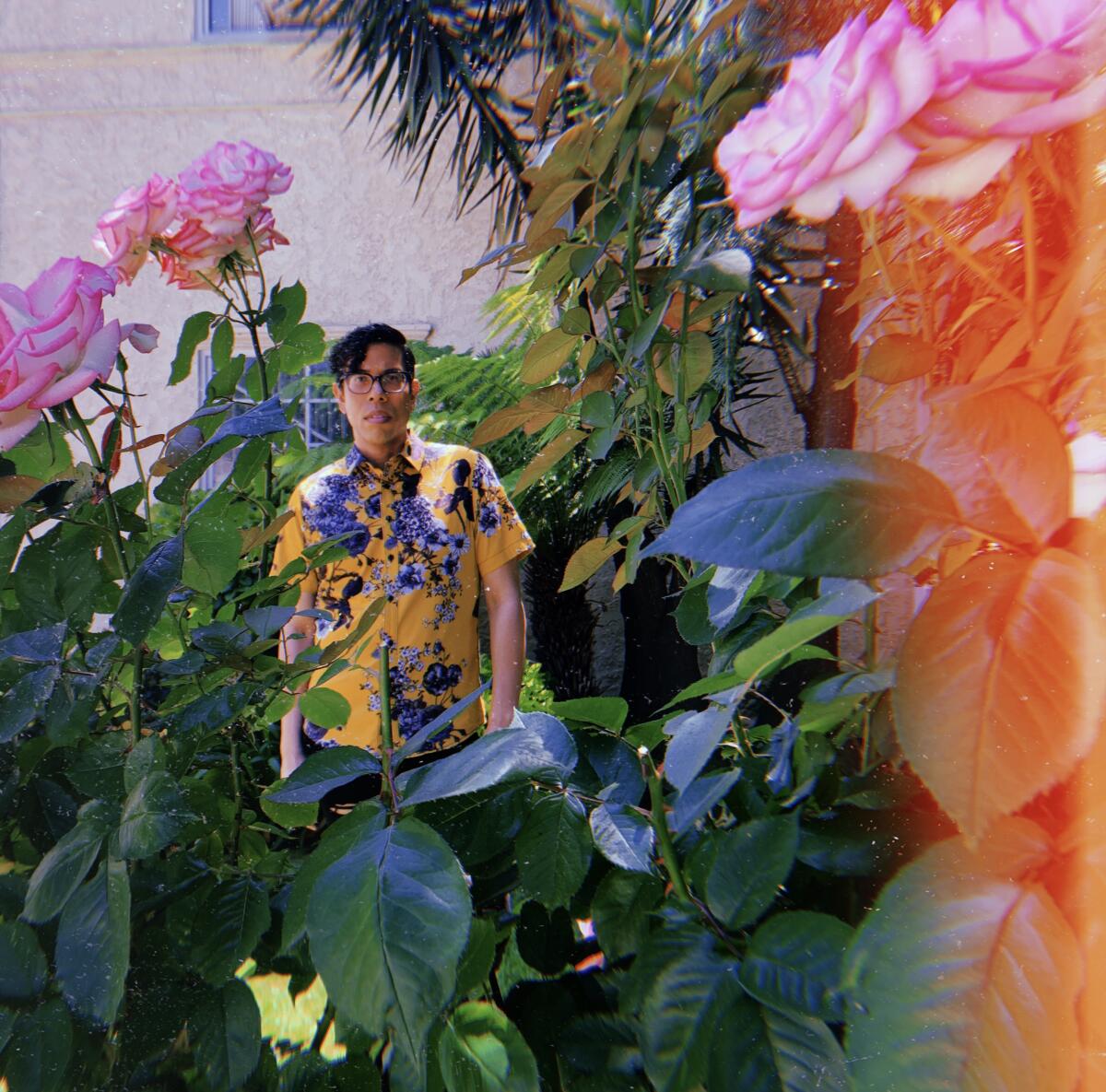
[This community] serves as a safety net for young people who have been rejected, are living on the streets and have no support from family or from the government. It was really important to let them know that we see you. We love you. We affirm you. You deserve to occupy space unapologetically.
“Pose” showrunner Steven Canals on the “beautiful community” pictured in his show about 1980s New York.
Chuck, what moved you to write about aging with “The Kominsky Method”?
Chuck Lorre: The physical entropy and what it’s like to be getting older and that sense of the culture moving away from you. I always visualize it as standing on a dock and watching a big ship leave and you wave and you’re not part of it. You’re not sure if you should be part of it. There’s an alienation element in getting older and feeling a cultural drift that you really don’t participate in. That was why I pursued this. Oddly enough, I also thought the body going to [expletive] was a funny thing.
Cate Blanchett, Cynthia Erivo, Nicole Kidman, Regina King, Hugh Jackman, Sandra Oh, Jeremy Strong and Kerry Washington instill humanity in their roles first.
You have one of my favorite actors in Alan Arkin; what did it take to get him involved with this project?
Lorre: The script got to Michael Douglas, and Michael signed on to do it. I was just astonished. I think Michael was very much what drew Alan. Alan read the script and met with me and said, “Well, I need to meet with this Michael Douglas fellow. I’ve never met him. I want to sit down with him.” I called Michael. He was staying in Los Angeles at a hotel and I called him and I said, “Alan Arkin would like to talk to you about doing this.” He said, “Send him over.” Alan drove across town and had a cup of tea with Michael and they discussed doing this. Then they called me back and said, “We’re doing it.” There was no greater feeling in the world than walking into Netflix between those two guys. Having Alan Arkin lean across the table to [Netflix chief] Ted Sarandos and saying, “Just so we’re clear, I won’t be doing any running.”
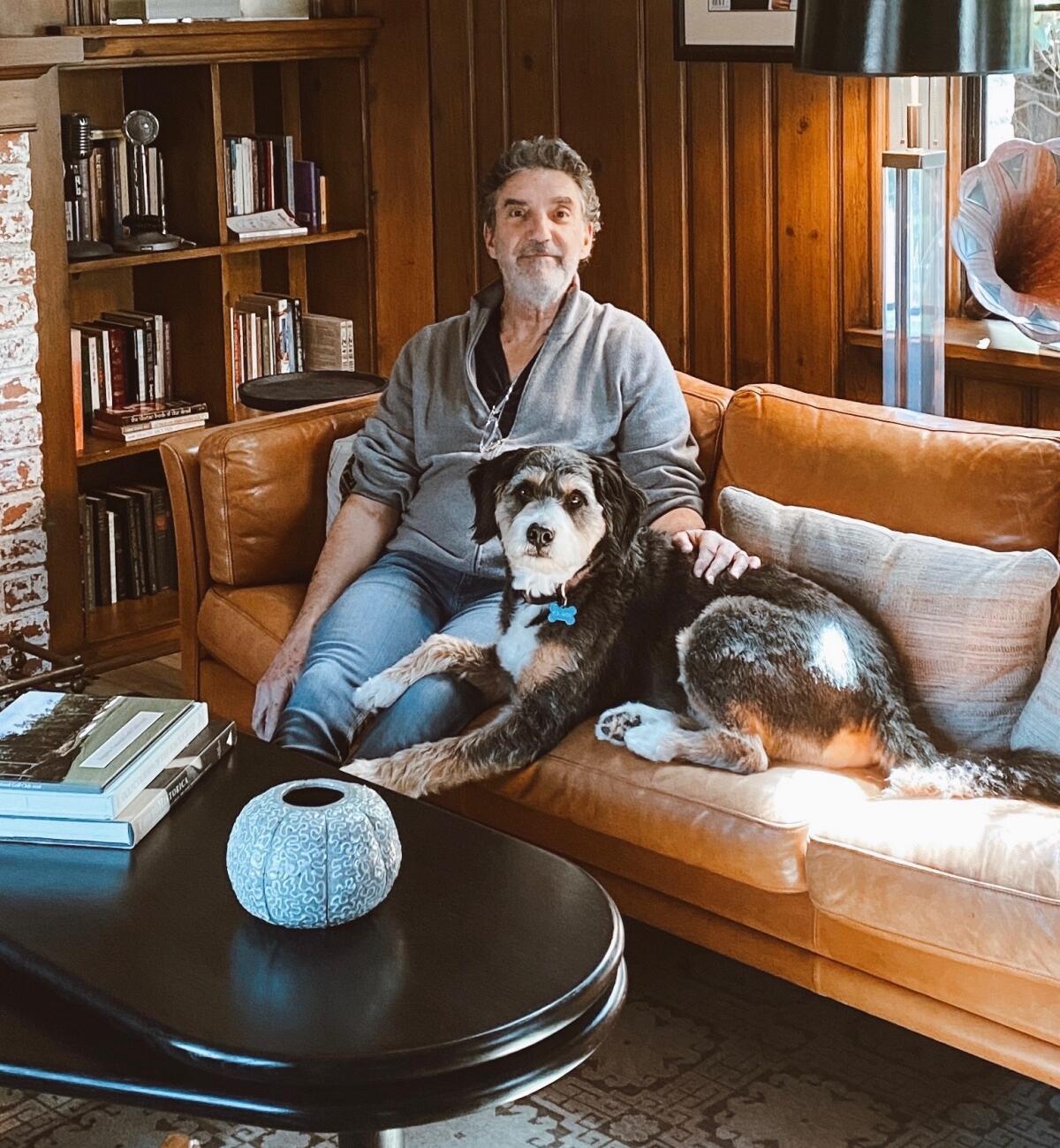
Chuck and Steven, you both use a deceased character as sort of a de facto therapist. Why?
Canals: This past season we made the choice to have one of our central characters die and that wasn’t a choice that we took lightly. Trans women of color have a life expectancy of 35. And in wanting to craft a narrative that is hopeful and aspirational, we also recognize that we have this this incredible ability to talk directly to our audience, and to educate and inform them in a way that isn’t didactic but in a way that brings them into the conversation.
The choice to continue to have that character return had everything to do with closure for the other characters on the show. I’m trying not to spoil it for people who haven’t seen it, but to have that character interact with every single person in their lives. To have her return had everything to do with the emotional arcs of the characters that she’s interacting with.
Lorre: Part of getting older is you lose loved ones. You lose people that are very much woven into your life. And it had been my experience that they never really go away. I lost my father in 1976. He’s very much a part of the conversation with me very often, all these years. But I didn’t want to tell a ghost story. I hope it plays that she’s really his better self. She exists to question his motives and his actions. And he’s talking to himself, he’s not talking to ectoplasm. He’s having an internal conversation embodied by her.
With some of this heavier material, how do you balance getting this information out without appearing as if you’re lecturing viewers?
Ehrin: I want it to be part of a whole fabric so that it feels very grounded. I want every [character] to feel like a real person — with some good and some bad so that they’re messy. So when you really do kind of lower the boom on someone in that kind of a structure and a pace, it is really gut wrenching.
Grant: I kept saying all along that we are not making a PSA. The information about the amount of sexual assault and how incredibly small the percentage of them that get reported is. And the remarkably small percentage that are prosecuted — that information is out there, but it’s something that makes people very uncomfortable for a number of reasons. So the solution then was just to tell a really compelling, personal story, to bring as much authenticity to the experience of the people going through it as you can. So that the audience members who may feel like they want to shy away from this issue, can’t because they’re so engaged. The human desire to understand each other, to feel a connection to each other is so profound.
“Unbelievable” showrunner Susannah Grant on telling a compelling true story.
Waller: I can’t think of a more boring-sounding thing than a constitutional amendment. So we were like, how do we possibly make this not didactic? And what we did in the writer’s room was we laid out the events that happened. This is the information, now where’s the drama? Where’s the personal story? We really focused on telling the story like we would tell a fictional story — what are the character arcs? What are the relationship dynamics? What are their journeys? By focusing [that way] we were staying away from the lecturing and the speechifying. And then I also think we trust our audience that if they need to stop and Google something, they will.
Hollywood recently has sort of embraced communities that were underrepresented in the past; do you believe that will continue? Or will the economic impact of the pandemic push decision-makers back to the things they know were profitable?
Canals: If you just look at this lineup of individuals, and this isn’t to specifically call you out, Chuck, but if you look here, you have three women. You have two queer people. So the fact of the matter is, just having all of us sitting here representing a small contingent of showrunners in this industry shows that the tide is changing. And now that we have our foot in the door, it’s our responsibility to hold that door open to allow for more creators to come in. And I don’t buy this notion of niche programming. I think niche is the new mainstream, frankly. And there’s so many places for content to live, and so there really is no excuse not to continue to have stories from historically marginalized communities being told.
Grant: Look at all these shows we’re talking about here today. They all did quite well and have found big audiences and 15 years ago would’ve struggled. And I always felt earlier in my career, “You are leaving so much money on the table by not telling these stories.”
Lorre: I’m just happy to represent dinosaurs.
[Laughter]
“The Kominsky Method” showrunner Chuck Lorre on “creating a more welcoming environment” in Hollywood.
What has it been like over the decades seeing the door open to more voices?
Lorre: It’s inspiring. You recognize your own blind spots, if you’re paying attention. You recognize your inclination is to surround yourself with other people that reflect you and reflect your background. And that in and of itself is destructive, and you don’t recognize it until you’re shown an alternative way of doing things. So it’s still a learning process. As Steven pointed out, that door has to be much wider. And we’re really talking about writing viewpoints, bringing different experiences into the process, so it’s not all Long Island Jews in the room.
Waller: Nothing against Long Island Jews.
[Laughter]
Your inclination is to surround yourself with other people that reflect you and reflect your background. And that in and of itself is destructive, and you don’t recognize it until you’re shown an alternative way of doing things.
— Chuck Lorre, “The Kominsky Method”
Levy: When people are allowed to express themselves really purely, I think that has led to this kind of shift in terms of the quality of the storytelling and the specificity of these shows. I mean the shows that I’ve been watching recently have such a special DNA to them. And each one of them is so specific and irreplaceable. That is a result of that kind of collective shift, people realizing that if we let people tell the stories they need to tell without completely deconstructing the idea with notes, you will get television that connects with people in a really powerful and specific way.
Waller: Specificity can be very universal and relatable. This idea that if it’s specific, it’s niche is just not true. The fact that everyone is watching “Unorthodox,” which is so specific and so niche, but it has universal things that we all relate to.
Kerry, it seems like “The Morning Show,” because it is about a news program, would lend itself to incorporating the pandemic. Are there any plans for that?
Ehrin: To some extent yeah. I’m in the middle of writing it, so I don’t want to talk about it too much, but it’s not front and center. That’s one of the challenges of that show is that you’re writing stuff a year... in this case, it could be two years in advance. We don’t know when we’re going to film again, but you have to write about news. You have to be a little bit of a psychic, to look at what’s happening in the world and go, “OK, what are the next three steps past that? Which way could it go?” And kind of pick one of those, and cross your fingers.
How are things going to change when productions return? Do we think that intimacy and love-making scenes are a thing of the past now?
Ehrin: God, I hope not.
Waller: I hope not.
Lorre: Cellophane!
Levy: I mean, like for Steven, you’re talking about 150 people in a ballroom. I don’t see much difference between the time when we’ll be able to do that and the time when someone will be able to kiss. Literally college dropout, have no idea what I’m talking about, but I do feel like there’ll be slow steps to getting to where we can have a slightly more regular production. But I can’t imagine that happening anytime soon.
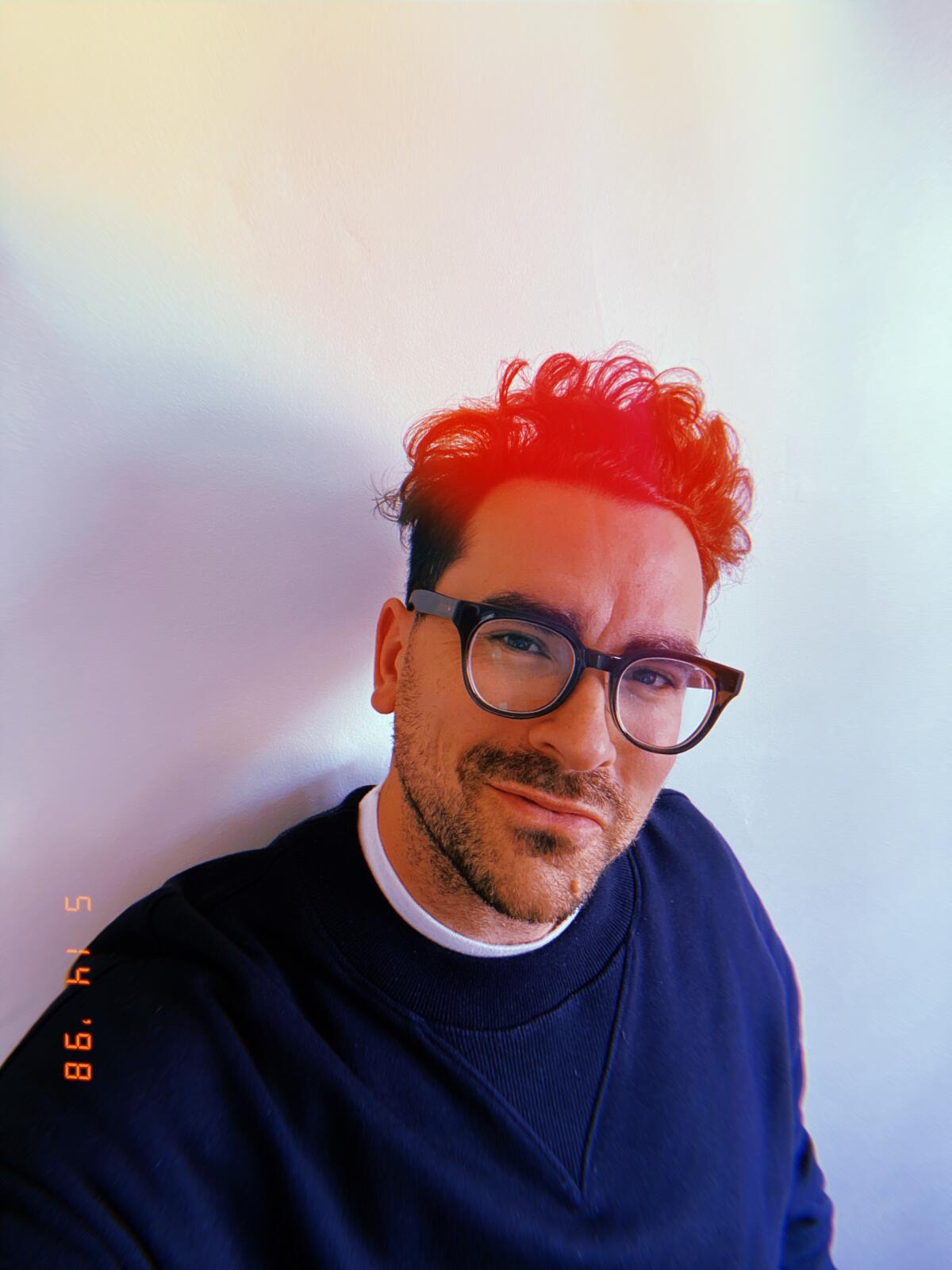
What were some of the more comical moments on your sets?
Waller: Definitely Cate getting pied in the face, because there was such a science to it, making sure you get it on camera because you’ve only got one take, and then making sure there’s a stand-in to take the brunt of the pie. So there’s a hierarchy of the pie throwing.
Levy: Working with Catherine O’Hara just inherently lends itself to a high level of comedy on screen and off. Catherine never did a single take that was the same. Every take was a different, unexpected choice, and every take was an unexpected laugh because you had no idea where she was going. And that was the great joy for me, was getting to watch [my dad and Catherine] play. Having a master class in character comedy was probably one of the greatest takeaways I’ll have of the show.
Canals: This isn’t a specific story, but obviously we shoot these really big ballroom scenes that have anywhere from 125 to 150 background [performers], about 75-80% of those are actually from ballroom. The thing that I love the most is to watch the crew as those scenes are being shot, because many of them have never attended a real ball. The energy of it is so alive. And it feels real, and so whenever we’ve had any guests on set, I always tell them, “You have to at some point just get behind a camera and be in that space with them, because it feels real, and it’s so magical and lovely.”
Lorre: I’ve been a big fan of Paul Reiser for many, many years, and I created this character for him on “Kominsky.” I added 50 pounds to his waist and put a bald cap on him with a little, ratty ponytail. When he came out of makeup the first time, he walked up to me and said, “[Expletive] you very much.”
And one of my favorite moments was a scene where he has dinner with Michael and Alan. And Paul clearly was in awe of Alan Arkin as a comic voice. And just to watch how he was capable of — playing tennis with Alan, let’s put it that way. The back and forth between the two characters was remarkable. It was watching two great masters of different generations do a comic scene, and it was just great to be a fly on the wall and see that happen. I didn’t want it to end.
Netflix reality series “Magic for Humans,” starring Justin Willman, joins “Upload,” “American Housewife,” “Search Party” and an Ian McShane classic this week.
The complete guide to home viewing
Get Screen Gab for everything about the TV shows and streaming movies everyone’s talking about.
You may occasionally receive promotional content from the Los Angeles Times.